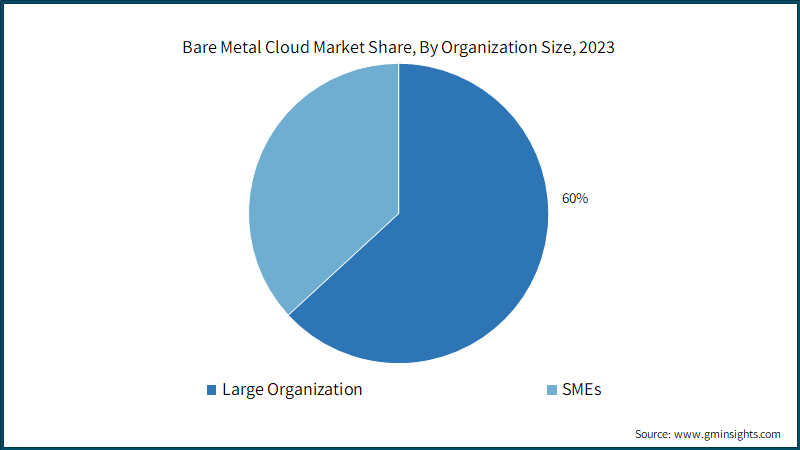Benefits of Bare Metal Cloud: Advantages and Use Cases Explained

Server hosting has evolved with time to provide numerous offerings, including shared and dedicated resources. Bare metal cloud is one hosting solution that stands out from the rest due to its distinctive approach to offering computing resources.
#What is bare metal cloud?
Bare metal cloud is a cloud service model where customers rent a dedicated physical machine, also known as a bare metal server, from a cloud service provider without the need to own or manage one. In addition, you still get total control, impressive performance, and security of your applications.
Like dedicated servers, bare metal clouds don’t share computing resources with other users. Each user is given access to an entire physical server, unlike the traditional cloud hosting model where virtual machines are provisioned on shared hardware.
Bare metal cloud gives users total control of hardware resources and the freedom to install whatever software stacks they need to run. For example, you can select the resources and operating system to install and other tech stacks.
This cloud model is mostly used by large companies and enterprises owing to its robust features and specifications, privacy, and high performance needed by enterprise-grade applications. Let’s take a deep dive and explore the benefits of bare metal cloud.
#Bare metal cloud benefits
#Enhanced security
Bare metal cloud servers are physically isolated from other servers, providing the highest level of security as opposed to traditional cloud servers which share the same hardware. The single-tenancy offered by the bare metal cloud model keeps side-channel attacks at bay.
Side channel attacks are security exploits that take advantage of hardware & firmware vulnerabilities, rather than security flaws arising from applications or services running in a server. The attacker gathers information inadvertently leaked by the server’s hardware through channels such as electromagnetic and acoustic emissions, timing, and power consumption.
Apart from applying patches the only defense from these attacks is renting a bare metal cloud and not sharing your server with other VMs. In addition, Isolation from other servers significantly reduces the risk of vulnerabilities emanating from other VMs.
#Improved performance
Unlike public cloud servers that are multi-tenant, dedicated servers that make up the bare metal cloud do not share resources. One server is uniquely assigned to a single customer and does not share its resources. With no resource contention, applications and services reap the full potential of dedicated resources resulting in impressive performance and reduced latency crucial for enterprise applications such as big data, streaming, gaming, and other resource-intensive applications.
#High customization levels
Bare metal cloud servers offer tailor-made custom solutions suited for specific hosting needs. The single-tenant model gives total control to customers over various aspects of the server. Users can choose what operating system and applications to install, as well as configure the desired hardware resources including CPU core, RAM, hard disk space, and critical services such as DDoS protection and automated backups.
The autonomy to fully customize the server allows customers to choose resources suited for specialized business workloads that often require specific configurations.
#Compliance
The isolation and high-level security offered by the bare metal cloud model make it ideal for businesses and enterprises to meet compliance standards such as ISO, HIPAA, and PCI DSS ( Payment Card Industry Data Security Standard ) which seeks to ensure that all companies that store and process credit/debit card information meet certain requirements for data privacy and protection.
Hence bare metal cloud servers are ideal for compliance-driven environments that handle sensitive and highly confidential data and must meet a stringent set of regulations.
#Scalability
Most cloud providers that offer bare metal plans offer an intuitive dashboard that lets you scale the resources up or down per changing business demands. This is similar to what you would get when deploying virtual servers, only that you will be enjoying the full benefits of dedicated hardware resources.
As with traditional cloud servers, you can scale hardware resources: from CPU cores and RAM to GPU, storage, and bandwidth capacity.
#Access to top-tier enterprise-grade hardware
One of the greatest benefits of opting for the bare metal cloud model is access to cutting-edge enterprise hardware such as GPUs for tasks such as complex visual effects, 3D graphics rendering, and Machine Learning. You also get access to NVMe SSD drives which deliver superior data transfer speeds, power efficiency, and overall improved performance for data-intensive workloads
#Predictable running costs & financial flexibility
Bare metal cloud servers are typically billed on an hourly, monthly, or annual basis. This approach makes it easy for organizations and businesses to plan their budgets due to the predictable nature of the pricing model. Additionally, budgets can be adjusted when hardware resources are added as and when needed to support growing and more demanding workloads.
Also read: Benefits of Kubernetes on bare metal
#Use cases of bare metal cloud servers
Having covered the benefits you can reap from deploying your workloads on bare metal cloud, let’s explore some practical use cases of this cloud offering:
#Financial services
Bare metal cloud servers offer powerful and high-performance hardware for reliable and high transaction speeds. In addition, compliance with statutory data protection regulations ensures that sensitive customer data is always kept secure and private.
#Big data and analytics
Big data applications are focused on collecting and processing huge sets of data. Data-intensive workloads are usually resource-intensive and require high-performance hardware to run smoothly. Bare metal servers provide top-notch and modern hardware infrastructure to guarantee high-speed data transfer rates, substantial storage capacity, and seamless handling of I/O operations.
#Gaming
Bare metal cloud servers provide superior hardware resources including powerful CPU, high-capacity RAM, cutting-edge GPU, and high-end network cards for high-intensity gaming applications with minimal latency.
#High performance computing ( HPC )
High-performance computing refers to high-capacity processing power, which encompasses carefully selected and well-tuned hardware resources, to perform complex computations across various domains. These components are carefully selected to deliver maximum performance with minimal latency and little overhead.
HPC is critical in areas that require enormous computational resources such as Virtual and Augmented reality technologies, research centers, Artificial Intelligence, Machine Learning, 3D simulations, etc. The use cases are innumerable.
Also read: How to Run Docker on Bare Metal Cloud
#Conclusion
In this tutorial, we looked at the bare metal cloud, its benefits, and popular use cases. The single-tenant model is, without a doubt, a secure and high-performance platform for hosting high-traffic, and data-intensive workloads that require superior hardware resources and utmost security for keeping threats and vulnerabilities at bay.
Get 100% dedicated resources for high-performance workloads.



